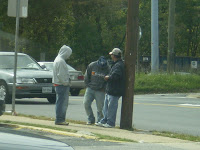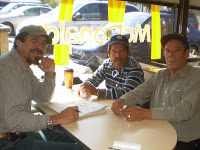Biggest hardship for Annandale’s day laborers: isolation from families
 Like many of the men gathered around Annandale street corners waiting for people to give them a job, Humberto Contrera, is having a hard time making ends meet while struggling to survive in a sometimes hostile environment where he can’t speak the language.
Like many of the men gathered around Annandale street corners waiting for people to give them a job, Humberto Contrera, is having a hard time making ends meet while struggling to survive in a sometimes hostile environment where he can’t speak the language. Arnoldo Borja, a community organizer with the Northern Virginia office of the Legal Aid Justice Center, says when he started working with Annandale’s day laborers four years ago, there were about 100 to 150 in the area along Little River between the 7-Eleven at the Hummer Road intersection and Duron Paints and Wallcoverings near Markham Street. Now, there are about 200 to 400. Borja estimates about 50 to 60 percent of the day laborers in Annandale are from Guatemala. Others are from El Salvador and Honduras, and to a lesser extent, Peru and Bolivia.
 |
| Borja, Contrera, and Maroquin |
For many day laborers, the worst hardship is being separated from one’s family. Contrera hasn’t seen his wife and three of his children since he left Guatemala five and a-half years ago.
Most day laborers come from rural areas and are lured by the American dream. “They see American TV shows where everyone has a big house and they want to live like that,” Borja says. “They originally plan to stay for a couple of years. They think they will make enough money to go home a success, but it turns out to be harder than they thought. They come with dreams and end up homeless.”
When they find out how hard it really is here, “a lot of people think they made a mistake,” here, says. “But they don’t want their family to see how they live here. They don’t want to be seen as failures.” But, he adds, “What is the amount of money you can make compared with the separation from your family?” He believes it is more important for children to have their fathers at home with them and decries “this big pain we carry with us—being away from our family.”
“They don’t know what they got until it’s lost,” adds Alfredo Maroquin, a day laborer born and raised in Texas. “Now I understand how much I love my mother.”
Maroquin has done apartment maintenance for 28 years, but says “I’ll do anything I can.” Since moving to Annandale in May, he has had a hard time getting work. “We’ll get a job once a month if we’re lucky.” He’s worried about coming up with his rent and might have to double up with a friend for a while. Meanwhile, Maroquin has been working for his church, the Iglesia Monte Los Olivos in Springfield, giving Bible lessons and teaching literacy.
Borja’s goal is to promote communication and understanding between the day laborers and the community, although he notes, “day laborers are part of the community.” He had been a science teacher at a college in Michoacán, Mexico, and left in 1991 after two of his friends, who had been working against corruption, were killed. His first job in the United States was picking oranges in California.
Borja would like to establish a community center for day laborers in Annandale to provide such services as English lessons, advice on nutrition, and social services. He doesn’t want it to be a “day laborer center” that just focuses on employment though, which has a negative stereotype resulting from conflicts in other communities. “We have to have a good memory of who we are and a long-term ambition of where we need to go,” he says.


Thank you for writing this article. I really appreciate your taking the time to interview some of the men and share their perspectives. I hope your article helps them. I know so many people who vehemently oppose their presence here. But, I really do believe that a community center is a good solution. I hope Annandale shows more tolerance toward its immigrant population than neighboring cities have shown.
Great article. I also thank you for taking the time to interview them and tell their side of the story.
great work Arnoldo!
good that the article pointed out that some day laborers are in fact US citizens.
Mr Borja should get in touch with the SEEC to see if together they can improve the education of day laborers.
Two words: Go home.
Fight corruption like we have in US history to force bad government in your own countries to change. To take advantage of us who have fought for generations to make this country great is flat wrong and unjust. Its stealing.
Maroquin's and Borja's stories really illustrate the crux of the issue. Because there is no impetus to make people play by the rules and enforce immigration policies, things like this and worse happen. I have no problem with day laborers with valid papers (although congregating in parking lots is not exactly the safest and best way to find work). Because we don't want people here illegally does not mean we "hate" them. Encouraging more illegal immigration is only going to make things worse so if Mr. Borja is willing to make his community center open to only documented workers, I am with him. If he is going to make it a magnet to help undocumented workers, he gets no support from me. It is easy enough to abuse workers who are US citizens…but for undocumented workers, it is easier. It benefits everyone, most of all the worker, if people are here legally.
I get why people are willing to die to try to get into the US. But there has to be rules that people follow to enter, exit, work and stay in the US or become citizens or else we have chaos (and potential security issues).
I no longer go to the Safeway on Little River Turnpike – I have seen the men urinating and spitting
When a US veteran comes home and cannot get assistance from the Health Department in obtaining food stamps for his family because he or she is having difficulty obtaining a civilian job but on the flip slide were handing out opportunities and benefits to people not even born here makes me wanna move to Canada